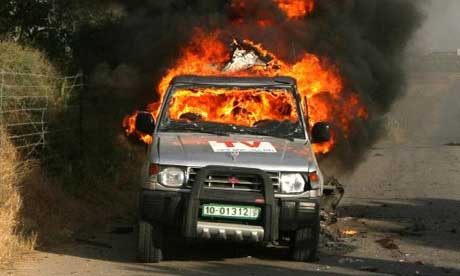Here in America, we journalists like to heap each other with praise for our tenacity and courage. Sometimes it seems a bit much.
Don’t get me wrong. There are plenty of courageous U.S. reporters and editors out there – small town editors who take on corrupt officials, investigative reporters who expose corporate misconduct, war correspondents who risk capture and death in some of the world’s most dangerous places.
But the truth is these exceptional journalists are just that – exceptions. Compared to our counterparts in many other lands, most of us reporters and editors in the States have it pretty cushy.
We’re protected by the First Amendment, good (though not always well-enforced) Freedom on Information laws and reasonable libel laws that accept factual accuracy as an absolute defense. Threats of violence against reporters are rare. And with notable exceptions – such as the Valerie Plame leak case – the government is loath to throw journalists in jail.
For many U.S. reporters, the worst consequence of reporting hard truths may be getting snubbed at a cocktail party. Or having a high-level official source – who provides mostly well-spun talking points and occasional “inside color” – quit answering their phone calls.
In many countries around the world, things are different. Professionals fighting to report the news endure daily threats from governments, terrorists, gangsters and other powerful forces.
According to the Committee to Project Journalists, more than 900 journalists have been killed worldwide over the past 20 years – 659 were murdered, 172 died in crossfire/combat, 111 died on dangerous assignments, such as covering demonstrations and riots.
And according to a count by Reporters Without Borders, nearly 300 journalists, media assistants and “netizens” have been imprisoned around the world so far this year.
Want to learn more about newspeople around the globe who risk their lives to get important stories? Here are links to a couple of short documentaries that do an excellent job of illustrating real-life profiles in journalistic courage:
- Storyhunter, a global network of video journalists, has produced a four-minute video about the risks faced by reporters in the Mexican state of Veracruz, where 11 journalists have been killed in the past 18 months.
- Free Press Frontier produced an 11-minute documentary, “Dateline Bangui,” about Jean-Magloire Issa, a radio reporter navigating the hazards of a presidential election in the Central African Republic.
For Issa, retaliation from government or military leaders is a constant worry.
“They could send their mercenaries to kidnap me, kill me, then it’s over for me,” Issa told the documentary’s executive producer, Jeanne Baron. “At least I know that if I die for telling the truth . . . my soul will rest in peace.”
(Full disclosure: Baron is a friend and neighbor of mine in Brooklyn.)
Michael Hudson is a senior editor at ICIJ and author of THE MONSTER: How a Gang of Predatory Lenders and Wall Street Bankers Fleeced America—and Spawned a Global Crisis.
![]() Subscribe to The ICIJ Global Muckraker by email or get the RSS feed
Subscribe to The ICIJ Global Muckraker by email or get the RSS feed
